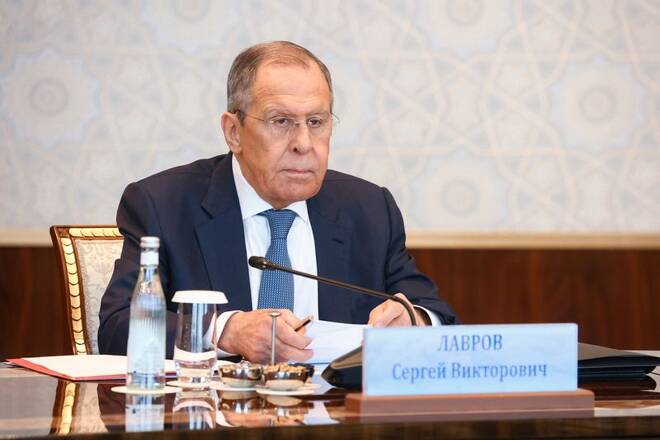Advertisement
Advertisement
Brazil’s Lula draws Russian praise, U.S. scorn for Ukraine views
By:
By Lisandra Paraguassu BRASILIA (Reuters) - Russian Foreign Minister Sergei Lavrov on Monday thanked Brazil for its efforts to resolve the conflict in Ukraine ahead of a visit with Brazilian President Luiz Inacio Lula da Silva, whose comments on the war have unnerved Washington.
By Lisandra Paraguassu and Anthony Boadle
BRASILIA (Reuters) -Brazilian President Luiz Inacio Lula da Silva drew criticism from the United States on Monday for his recent comments suggesting the West had been “encouraging” war by arming Ukraine, while he was praised by Russian Foreign Minister Sergei Lavrov for his proposal for peace talks.
Lavrov, on a visit to Brasilia, met with Lula and thanked Brazil for its efforts to resolve the conflict. But a White House spokesman accused Lula of “parroting Russian and Chinese propaganda without looking at the facts.”
Lula has pitched himself as a broker for peace talks to end the Ukraine conflict, which began when Russia invaded the neighboring country in February 2022. That proposal was based on Brazil’s tradition of non-intervention and open diplomacy.
But Lula has angered many in the West with comments over the weekend, when he called for Western powers to stop providing arms for the war. The comments came shortly after he returned from China, where he discussed the matter with Chinese President Xi Jinping.
“The United States needs to stop encouraging war and start talking about peace,” Lula said on Saturday in remarks to journalists.
He also called for a group of countries not involved in the war to engage Russia and Ukraine in peace talks.
“But we also have to talk to the United States and European Union. We have to convince people that peace is the way,” he said.
Lavrov told journalists in Brasilia on Monday that Moscow was “grateful to our Brazilian friends for their clear understanding of the genesis of the situation.”
“We are grateful for their desire to contribute to finding ways to settle this situation,” he said.
John Kirby, the White House national security spokesperson, said on Monday that Lula’s comments were “simply misguided” and missed the mark by “suggesting the United States and Europe are somehow not interested in peace, or that we share responsibility for the war.”
So far among Western nations, only French President Emmanuel Macron has welcomed Lula’s peace initiative. The Brazilian leader’s call to halt arms supplies to Ukraine has not gone down well among most diplomats.
“It raises alarms bells,” said a European ambassador in Brasilia, adding that ending weapon supplies for Ukraine was tantamount to taking sides with Russia.
“It is a war of aggression and defense. If they have no arms, the Ukrainians lose the right to self-defense,” the diplomat said, requesting anonymity.
Kyiv, Washington and other allies say a ceasefire now would leave Russia in control of territory it seized by force, and Ukraine has a right to seek Western arms to drive the invaders out.
The European Union also rejected Lula’s suggestion that both Ukraine and Russia are to blame for the war. EU foreign affairs spokesman Peter Stano said all aid was aimed at Ukraine’s “legitimate defense.”
Earlier this year, Lula refused to supply ammunition to Ukraine, as reportedly requested by Germany.
(Reporting by Lisandra Paraguassu and Anthony Boadle, Additional reporting by Steve Holland and Patricia Zengerle in WashingtonEditing by Brad Haynes, Peter Graff and Rosalba O’Brien)
About the Author
Reuterscontributor
Reuters, the news and media division of Thomson Reuters, is the world’s largest international multimedia news provider reaching more than one billion people every day. Reuters provides trusted business, financial, national, and international news to professionals via Thomson Reuters desktops, the world's media organizations, and directly to consumers at Reuters.com and via Reuters TV. Learn more about Thomson Reuters products:
Did you find this article useful?
Latest news and analysis
Advertisement
